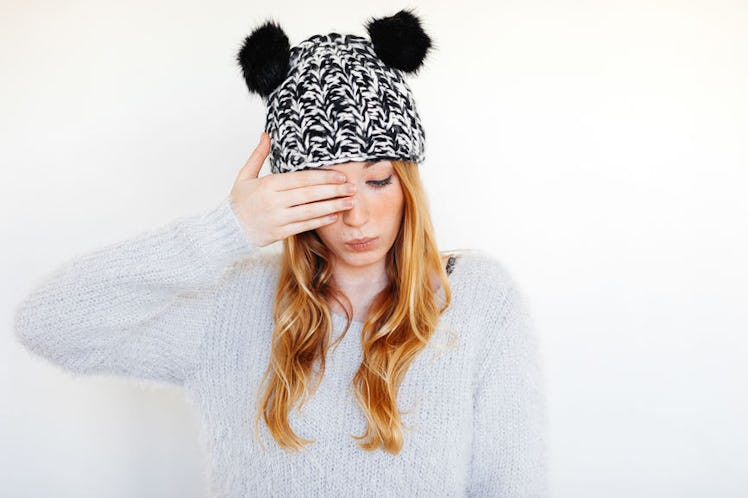
Science Says Your Eyes Might Reveal This One Emotion You're Feeling On The Inside
You might be skeptical about that whole “the eyes are the windows to your soul” mumbo jumbo, but science just made a compelling argument for why there might be some truth to it, so listen up. Remember that time you woke up with bags under your eyes (far from designer, maybe knockoff model), and a co-worker casually dropped a concerned “you look exhausted” into conversation? You did stay up until 1 a.m. watching Riverdale the night before, but that was supposed to be your little secret. Well, your eyes gave you away, and apparently stress affects the way you look, too. Coincidentally, the visible cues all seem to start with your pretty little peepers behaving all funky.
Personally, I’m pretty sure dark circles have just been permanently haloing my under-eyes since college, so who’s to tell if I’m actually tired, or if this is just my natural ~lewk~ now. But, I digress. Interestingly enough, discoloration under your eyes isn’t what gives your stress levels away (though, if you’re anxious, you may not be sleeping so well, so they could make a cameo at some point). Rather, researchers are now linking high stress with a lot of erratic eye movement and a shift in pupil dilation, so you might not even be aware of the visible activity that's giving people a clue that you just might be in over your head.
There’s really no denying it: Life is demanding AF these days. For one thing, if you have a high-pressure job, you might be scrambling to finish a few different tasks all at once, all the time. Then there’s having to juggle office hours with happy hours, classwork, family visits, and, somehow, making time for a little R&R. But with so much to accomplish in so little time, some of these things will end up becoming less of a priority, and it’s rarely the things that cause us the most stress that get put on the back-burner.
What’s interesting about stress is that it can affect you in ways you don’t even realize: It’s in your walk, your talk, the way you hold yourself, and, according to a new study published in the International Journal of Human-Computer Interaction, it's in your eyes, too. As per the University of Missouri’s press release about the study, researchers from the institution have uncovered new evidence that stress can affect the way you look, and that you might be able to tell how stressed someone else really is, just by paying close attention to the way their eyes move. To make the connection, researchers compared data they drew from a NASA metric that measured workload, with their own observations of how participants’ eyes responded to a series of tasks. In the end, the researchers found that, the more complex a task was, the more erratic the participants' eye movements were.
“Many people multitask, but currently there is no measurement for someone’s mental well-being,” study co-author Jung Hyup Kim, an assistant professor of industrial and manufacturing systems engineering in the MU College of Engineering, said in a statement for the university's press release. “However, we found that the size of a pupil could be the key to measuring someone’s mental state while they multitask.”
In other words, your pupils — aka those black holes in the center of your irises that control how much light enters and is absorbed by the eye — are constantly changing in size. When you experience significant amounts of stress, according to the study's findings, your pupils will naturally begin to dilate at a faster pace. Pretty trippy, right?
Now, correct me if I'm wrong, but from what I'm understanding, unless someone is blatantly staring deep into your eyes at the very second you start to feel overwhelmed, this specific change in the way you look sounds pretty subtle. However, if the stress you're experiencing during the time you're awake starts to negatively affect your sleep, your pupils aren't the only parts of the eye that will give your mental state away.
According to Chris Brantner, a sleep science coach and the founder of SleepZoo, there's a strong correlation between stress and sleep. The more anxious you are, the harder it might be to calm your body and mind when it's time to wind down and rest up for the next day, Brantner tells Elite Daily. This can ultimately lead to sleeping less, getting poor-quality sleep, and this kind of distress will definitely show on the body — specifically, the sleep science coach says, in and around your eyes.
"Lack of sleep resulting from stress can make your eyes red, cause puffiness around them, and result in bags. All of which can make you look stressed," Brantner tells Elite Daily over email. Consequently, he explains, it can spiral out into a really vicious cycle, because not getting enough sleep can actually cause you to feel more stress, which can affect your work performance, your mood, appetite, etc.
Of course, this is nothing to feel ashamed of or self-conscious about. Stress happens, and it's only natural for your mental health to show through your physical body. What's important is that, as soon as you realize you're feeling overwhelmed or anxious, try to take a step back and take care of yourself. Brantner suggests starting by making sure you're getting enough sleep, and sleeping well. Rest, fuel your body with foods that are rich in nutrients, consider taking up a hobby that promotes relaxation, like yoga, and if you're still feeling as though you're in over your head, reach out to your doctor to discuss what other options you might consider.